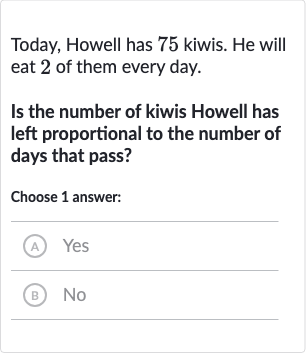Full solution
Q. Today, Howell has kiwis. He will eat of them every day.Is the number of kiwis Howell has left proportional to the number of days that pass?Choose answer:(A) Yes(B) No
- Understand Proportionality Definition: To determine if the number of kiwis Howell has left is proportional to the number of days that pass, we need to understand the definition of proportionality. Two quantities are proportional if they have a constant ratio. In this case, we need to check if the ratio of the number of kiwis left to the number of days passed remains constant as days go by.
- Denote Days Passed as : Let's denote the number of days that pass as . Howell eats kiwis per day, so the number of kiwis he eats after days is .
- Calculate Kiwis Eaten After Days: The initial number of kiwis is . After days, the number of kiwis left would be the initial number minus the number of kiwis eaten, which is .
- Check for Proportionality Ratio: To check for proportionality, we need to see if the ratio is constant. This ratio simplifies to . We can see that as the number of days increases, the ratio changes because the term decreases. Therefore, the ratio is not constant.
- Conclusion: Since the ratio of the number of kiwis left to the number of days passed is not constant, the number of kiwis Howell has left is not proportional to the number of days that pass.
More problems from Is (x, y) a solution to the system of equations?
QuestionGet tutor help
QuestionGet tutor help

